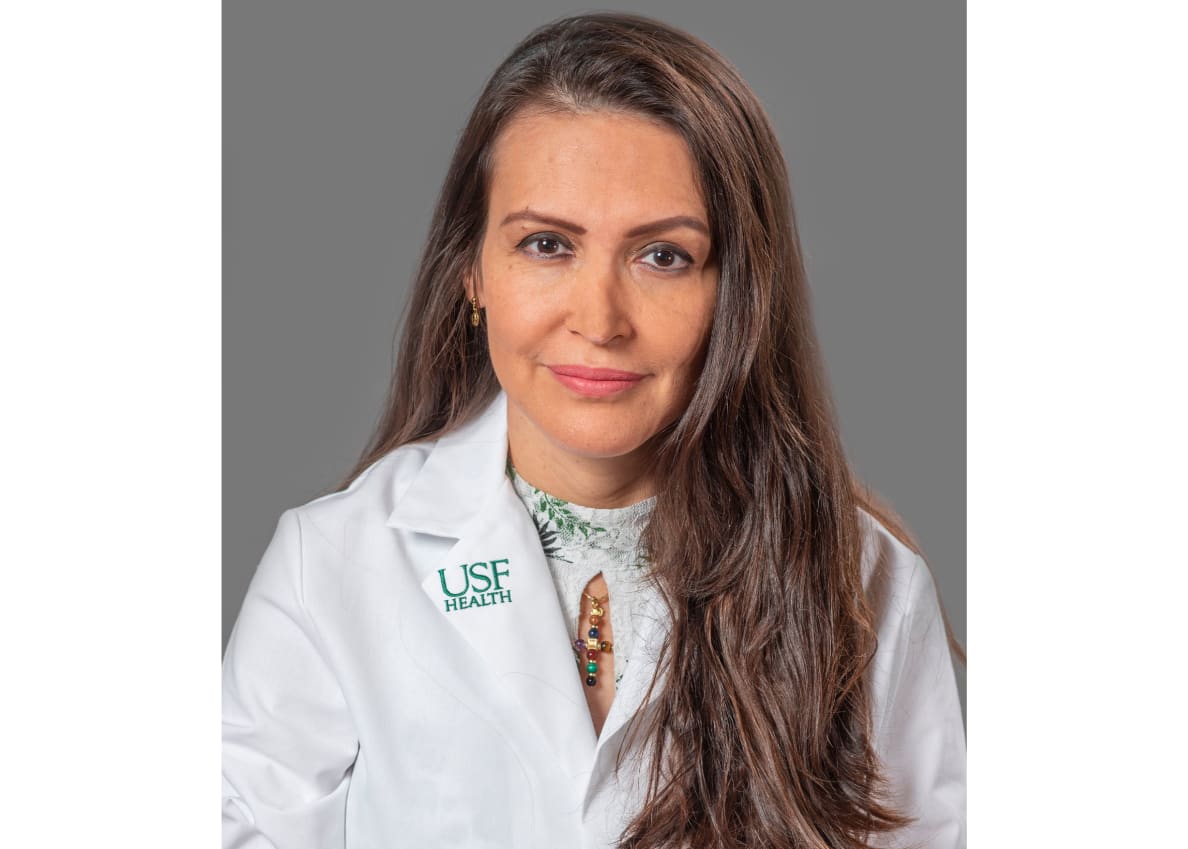Photo Illustration by Thomas Levinson/The Daily Beast/Getty
As 2021 concludes with record numbers of new COVID-19 cases in Florida and the nation as a whole, Dr. Claudia Espinosa plans to spend New Year’s Eve quietly with her family in their Tampa home.
“I am just going to stay in my house, probably go to bed early,” she told The Daily Beast.
But she knows that even though Florida reported 46,923 cases in a single day, many people will be gathering to ring in 2022 as if the paramedics were not suddenly roaring back.
“I know that nobody cares,” Espinosa, a pediatric infectious disease specialist at the University of South Florida, said. “A lot of people are gonna get together and then we are going to have more cases. That is just the way it is going to be.”

Dr. Claudia Espinosa.
USF Health
She added, “It’s discouraging because here we are again, just being the same.”
Less than a month ago, COVID-19 in Florida seemed to have subsided into a manageable menace. Nearly two-thirds of Floridians were vaccinated. More than 4 million in the state had been infected and received a measure of immunity.
Florida Gov. Ron DeSantis remained sunnily optimistic at a Dec. 17 press event even as a new COVID variant with a “Frankenstein mix” of mutations was spreading from South Africa to America. He suggested that anybody who did get sick could simply get an infusion of monoclonal antibodies such as President Trump received after getting COVID. The governor’s newly appointed surgeon general, Dr. Joseph Ladapo, mocked states that were seeking to fight the virus with mandates for vaccines, face coverings, and testing.
“It’s the trifecta,” Ladapo said. “It’s lunacy.”
But neither DeSantis nor Ladapo had much to say when two of the three main monoclonal antibody treatments—REGEN-COV and Bamlanivimab/etesevimab—soon after proved to be ineffective against the Omicron variant.
“We cannot use those anymore because they are not working,” Espinosa noted on Wednesday.
The third treatment, Sotrovimab, seems to be effective but is in very short supply.
“Right now, we are trying to prioritize and just give it to people who most likely would die,” Espinosa said. “And those are the immunosuppressed people, or the ones that have a lot of risk factors. Those are the only ones that we are able to use these medications [on], because we have to be very conscious how we use the resources.”
At the same time, Omicron was proving able to circumvent some of the protective powers of the jab.
“The vaccine doesn’t seem to be working as well,” Espinosa said. “So that is scary. There are a lot of breakthrough cases.”
Vaccinated patients were still better off.
“The ones that get the vaccine, they have less time of infection, less chance to go into the hospital and die,” she noted. “So it is a good thing to just go ahead and do it.”
In a bonus to breakthrough cases that seems to have more to do with economics and science, the CDC has halved the recommended quarantine time for the vaccinated from 10 to five days. The CDC does recommend wearing a mask during the five-day reprieve, but those who shun face coverings are not likely to comply.
As it is, Espinosa sees few masks as she goes about Tampa.
“It’s very seldom,” she said. “People are mostly without masks.”
She remains mystified by the resistance of performing such a simple public duty.
“Nobody should have a problem doing it,” she said. “I don’t understand that. I mean, come on, people, after two years, it should be like a no-brainer, right? I don’t know what we have to fight about that. We do it in the hospital. I don’t know why people don’t do it everywhere. Why kids don’t do it in the school. I mean, that just doesn’t make sense.”
Her family does it as a matter of course.
“We go out and we just use the mask,” she said.
Last month, DeSantis enacted a law prohibiting mask mandates at schools. Espinosa’s 11-year-old daughter—who was vaccinated the first week she was eligible—nonetheless continued doing what common sense dictates.
“She still goes to school with her mask and she still doesn’t take it off,” Espinosa said. “I don’t even have to tell her. She knows she doesn’t want to get sick. She hasn’t been sick and she doesn’t want to be there. And so she does it on her own.”
Espinosa figures on being with her daughter on New Year’s Eve. She will then proceed into 2022, no doubt treating kids who became ill because their families ignored simple precautions that are everyone’s civic duty. She fears that the days ahead may see other variants emerge from places where too many people do not even have the opportunity to get the jab.
“There will be another one unless everybody in the world gets vaccinated,” she said. “In places where there is not enough vaccines like in Africa or any other place where there are not good rates of vaccination, or they just don’t have it available, the mutations are going to occur. It will be later or sooner, but we are gonna have it.”
She looked back over the past year and ahead to the one to come.
“It’s really not reassuring, the panoramic view right now,” she said. “But, you know, we just have to keep working.”
And as Espinosa works with critically ill patients, DeSantis might respond to calls from Orlando County Mayor Jerry Demings and other local officials that he do more to ensure there is adequate COVID testing available. People in Orlando waited in line for as long as five hours this week.
In a more perfect Florida, DeSantis would also reconsider his position on face coverings. He used an 8-year-old girl who opposed them as a prop when he signed the law barring mandates in schools. Espinosa’s 11-year-old is the one for us all to follow.

